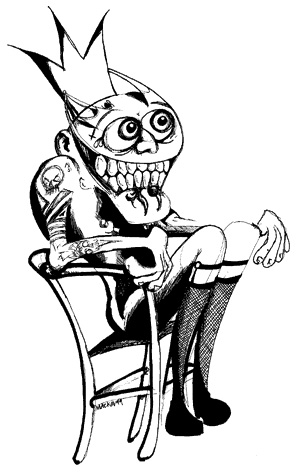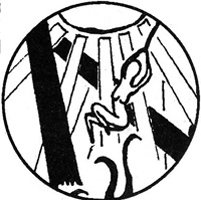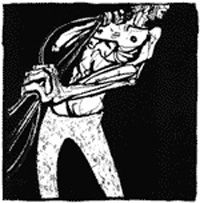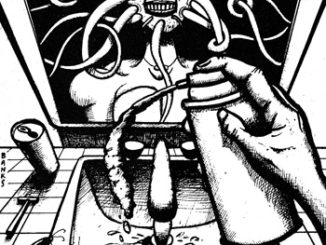 Performance Anxiety
Performance Anxiety
by Rich Mackin
illustration by Rich Mackin
I was watching a Metallica documentary on VH1, and unfortunately, that means that I have to take a moment to explain my thoughts on that. Is VH1 now so hip that they play Metallica, or are Metallica so lame that they are on VH1? Why am I watching VH1 if I think it’s lame? Why are they still called Metallica when they aren’t really metal anymore? OK, I got that off my chest, so I can make my point – Metallica made two good points in the interview segments: 1) that selling out in terms of running out of seats doesn’t have to mean selling out your soul, and 2) as important as it is to know how you want to be (specifically onstage, but also in life), you also need to know how you don’t want to be. The latter was evidenced by Axl Rose walking off stage because he didn’t feel up to performing that night, the night in question being the Metallica/ Guns ‘N Roses concert in which Metallica frontman James Hetfield blew up, cutting short their set. Needless to say, with both acts nixed, there was a riot, and Axl Rose was branded not so cool.
I’ve been thinking about this a lot in the last weeks after seeing several very different shows. I myself have been in bands, performed, and do spoken word, so I tend to look at everything a performer does, not just the official act. The first show in the batch was Karen Finley: a big deal show put on by Bad Grrls and Eventworks, mostly friends of mine, at Mass College of Art. Big, big, big crowd. The opening act was Emily Dotten, who’s previously helped me win “who was at the weirdest party” contests by dancing with flaming batons, nude, in a trance-like state. She was followed by Bitch ‘N’ Animal, a two woman performance art/musical act. I could debate their politics for pages, but to sum them up, they are very talented musicians with very defined beliefs that I personally was not entirely impressed by. But they certainly had a goal, achieved their goal, so as an act, they were successful. They also were a hit with the crowd. Between songs they bantered to an audience of hundreds as if they were with a few close friends.
After a short intermission, Karen Finley came on. Billed as a performance artist, she basically did a spoken word set. Not that I mind spoken word, being a spoken word performer myself and enjoying the form immensely. I’ve watched Henry Rollins essentially blab aimlessly for three hours straight with a smile on my face, but when you expect bizarre activity, it’s a bit disappointing to see someone on a stool, reading. It would be like seeing GWAR just playing music. Even though I like Rollins’ spoken work, I wouldn’t want to see it if I went to a Rollins Band show. Context and presentation are important. I was also a bit disappointed seeing Finley read – as in she hadn’t memorized the text, but was reading it. That’s fine for your average open mic poet who has a real job and thus doesn’t have the time to memorize everything, but when I give someone $15 of my hard-earned cash for talking, I expect them to not have to read from a script. Some artists need the text – or truly use it. Boston comedian Jen Kirkman juxtaposes snippets from women’s magazine articles, using the fact that she’s reading from something as part of the act itself. But it irked me to see someone with such a lofty reputation need a crutch.
A moment of this show that most audience members remember is when someone took a photo, and Karen stopped in mid-piece and told the photographer that she’d warned him (I think it was a him) not to take pictures. Isn’t there some adage about “the show must go on?” Isn’t breaking character considered bad? Or is Karen looking to join Casey Kasem and the fodder of America’s Funniest Bloopers? Actually, she hadn’t said anything about no pictures, she had mentioned that she was annoyed by the little red light on someone’s camera. She never said “No photos.” It would’ve been easier to have posted a “no photos” sign at the door. I understand not wanting unauthorized photos – that’s fair, but wouldn’t preventing the situation be easier?
At the end of the show, I used my, ahem, “connections” to go backstage. Previous similar events usually involve the performer being social – I know my favorite part of touring is meeting people. I noticed that a good deal of the backstage was marked off for Karen only, while another part was “everyone besides Karen.” Not that a celebrity shouldn’t get some privacy, but I found it odd that the person who sat and read needed more privacy than the woman who covered herself in body paint and danced with fire.
A direct contrast was Ron Athey at Mobius. Ron may not be as well-known, but he’s perhaps more infamous. Past performances have included piercing and other bloody stuff. This show, “The Solar Anus,” started with a large-screen video of Ron getting a large sun tattooed on the title body part. He came onstage and almost immediately pulled a three-foot string of pearls out of himself. Later, he put hooks on strings in his face and pulled his skin tight as if having a super facelift, attaching the strings into a crown. Toward the end was what promotional material called the “self-penetration can can,” involving some X-rated stirrups.
This is the sort of stuff you expect when you see “performance art.” No talking, nudity, and lewd behavior from weird-looking people!
This wasn’t a show for everyone. Even those who weren’t shocked didn’t necessarily like it, and the appeal was limited to a small audience, mostly gay men with piercings, handle-bar mustaches, and lots of leather. And art punk rock types. Pretty much everyone there I knew from art punk circles, or looked like they’d hang out at the Ramrod (and having lived across the street from it for two years, I say this with an informed mindset). I’m not going to say Ron’s performance was better or worse than any I’ve seen – it’s hard to compare stuff this unusual. The thing that impressed me was what happened AFTER the show. For better or worse, the guy did some really extreme and personal things in front of us, and after taking a break to clean up and compose himself, he came out and hung out with anyone who wanted to talk.
It had been announced that he would be available to talk, but that often invokes the image of a line, a table, and formality. I’d been waiting for this to happen when I realized that he had actually been in the back, chatting for some time. I sat right in front of him, and when he finished what he had been saying, he looked at me as if waiting for a comment. “I don’t know what to say” was my reply. To those who know me, to leave me at a loss for words is very impressive. Ron’s response was, “You could say your name – I’m Ron.” He outstretched his hand to shake. This floored me. Here’s a guy with a shaved head, covered in tattoos, who makes his living doing stuff in front of a crowd that most people wouldn’t consider doing at home alone after lots of drugs, and he’s essentially saying “what’s up?”
It was also funny that he introduced himself. It was, of course, the polite thing to say, the appropriate thing socially, but at the same time, of course he was Ron. I came to the show. I paid money to see him. He was the only person performing. He didn’t need to tell me who he was.
I couldn’t help but contrast the two shows – one artist makes a big deal of her need for respect but does little to earn it, another opens himself (quite literally) to the audience, and then joins them as an equal. It made me think of an Ozzy Osbourne interview in which Ozzy tells of his wife’s advice – that without the fans, you’re nobody.
The very next day, I was at the Greek American Club in Cambridge for the Bouncing Souls/Anti-Flag/some-other-band-I-missed show. There were several other people I knew there that were more or less my age, but I do find it interesting that most folks would rather go to a bar and listen to a jukebox where they can drink than go to see a band they like because the show is “all ages.” “All ages,” like “fun for the whole family,” is understood to mean “for kids,” so it might as well be an “under 18 show.” In any case, I was really, really old compared to most of the crowd, and I don’t think it’ll be long before I am hanging out with people that have parents my age. Not that I’m even all that old, I guess I’m just always out of context.
Anti-Flag were the supporting band. They’re a punk band. They write songs about punk rock. On their CD, Die for the Government, five of seventeen songs are specifically about poseur punks, another three are implicitly about the same, and the rest are mostly standard punk rhetoric such as “Fuck Police Brutality” and “Red White and Brainwashed” – subjects of 600 other songs, except many of them detail specific problems. If the system is bad, shouldn’t you tell me what specifically about the system is bad, so perhaps I can do something about it? Or maybe it’s easier to say that you’re a rebel than research the reasons for it.
It’s funny to see people try to be shocking and offensive by reiterating 20-year-old sentiments the day after you shook the hand of a man who’d just stuck foreign objects in his bum.
I happen to like politics in music and art. I think they’re effective ways to communicate, and if you want to inform me of something, write a song about it. But Anti-Flag present their politics between songs, and they didn’t even seem to know what their politics were. “We’re bombing Serbia, and I am not sure whether that’s a good thing or a bad thing…” It would even make sense if there was a “but either way, let’s hope its over soon” or something. Nope, just lots of time spent talking, well, rambling, about the subject without presenting any actual information, or even an opinion. I also get annoyed when someone says “I don’t mean to preach, but…” and then they do. If you don’t mean to preach, don’t. But if you preach, preach. If you want to tell me something, tell me. You don’t have to shove it down my throat, but tell me what you think. I would rather hear something I disagree with from someone who is informed, opinionated, and articulate than hear something half-assed from someone who seems more concerned with having an opinion than with what that opinion is.
The Bouncing Souls write songs about ’80s movies and such. They don’t have such a political reputation, so I scrutinize them less. But, you know, it wouldn’t be cool to smash a hole in the ceiling of a well-to-do Lyons Group club, and it certainly wasn’t cool when the singer poked a hole in the ceiling of a D.I.Y. all-ages club. In a city where certain types of bands can’t get a club gig and need to play rental halls, making the rental halls mad isn’t so smart.
So here I am at the end of a week, with less money after going to all these shows. I enjoyed all three, but came out of two annoyed by the actions of the performers – not because I didn’t like their acts, but by other stuff they did. And the controversial guy who I expected to be borderline evil was one of the friendliest people I’ve ever met. If only I could find a magazine that reviewed artists not by talent, but by behavior. Am I expecting everyone to be role models here, despite the talk of how we shouldn’t expect sports stars to be role models? No. Just because someone is an artist doesn’t make them more important. But as long as you are at your own show, realize that YOU are the reason people came, so be cool about it.



